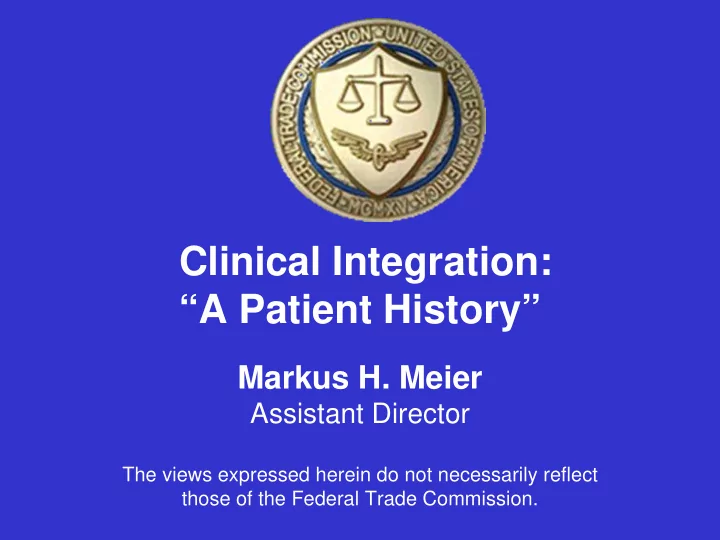

Clinical Integration: “A Patient History” Markus H. Meier Assistant Director The views expressed herein do not necessarily reflect those of the Federal Trade Commission.
Session Outline 1. Review the purpose of antitrust law. 2. Examine the guidance on clinical integration in the case law. 3. Discuss the history of clinical integration. 4. Consider the guiding principles we follow. 5. Take questions and comments.
The Purpose of Antitrust Law • Prevent private business practices that unreasonably restrain competition. • For the benefit of consumers: –Lower prices –Better quality –Increased choice, selection, convenience, and innovation
Arizona v. Maricopa County Medical Society (1982) • The Supreme Court made clear that physicians in independent practices are supposed to compete. • When physicians don’t compete, by collectively setting the prices at which they sell their individual services, they can be guilty of illegal price fixing.
Maricopa “The agreement under attack is an agreement among hundreds of doctors concerning the price at which each will offer his own services to a substantial number of consumers . . . [T]he fee agreements . . . are among independent competing entrepreneurs. They fit squarely into the horizontal price-fixing mold.” (pp. 356-57)
Maricopa & Financial Integration • To avoid condemnation as an illegal price- fixing conspiracy, the Supreme Court said, the agreement needs to be: “. . . analogous to partnerships or other joint arrangements in which persons who would otherwise be competitors pool their capital and share risks of loss as well as the opportunities for profit.” (p. 356)
FTC & DOJ Guidance • Statements of Antitrust Enforcement Policy in Health Care (1993, 1994,1996) • Antitrust Guidelines for Collaborations Among Competitors (2000) • MedSouth Advisory Opinion Letter (2002) • Improving Health Care: A Dose of Competition (2004) • Suburban Health Organization Advisory Opinion Letter (2006) • MedSouth Follow-Up Letter (2007) • GRIPA Advisory Opinion Letter (2007)
Clinical Integration • An active and ongoing program to evaluate and modify the practice patterns of physicians and create a high degree of interdependence and cooperation to control costs and ensure quality. • The goal is to create a meaningful prospect of: – Improving efficiency in the delivery of care – Reducing costs – Better managing utilization, or – Improving the quality of care • Even if there is some integration, any agreement on price must be “reasonably necessary” to realize the efficiency goals.
MedSouth & SHO : Some Lessons • Achieving clinical integration is not a matter of the quantity of clinical activities, it is a matter of their quality . • Ancillarity – that is, the nexus between the clinical activities and joint price setting – remains a critical inquiry. –See, e.g., the recent 5 th Circuit decision in North Texas Specialty Physicians v. FTC
Questions from DOJ/FTC 2004 Report • What do the physicians plan to do together from a clinical standpoint? • How do the physicians expect to accomplish these goals? • What basis is there to think that individual physicians will actually seek to accomplish these goals? • What results can reasonably be expected from undertaking these goals? • How does joint contracting with payers contribute to accomplishing the clinical goals? • Is it necessary for physicians to affiliate exclusively with one IPA or can they effectively participate in multiple entities and contract outside the group?
Guiding Principles • Competition has an important role to play in health care, notwithstanding the special characteristics of these markets. • There is no need for special antitrust rules. • Antitrust enforcement ensures that innovations by private actors and governments can compete for acceptance in the marketplace. • Antitrust does not pick winners and losers.
www.ftc.gov
Recommend
More recommend